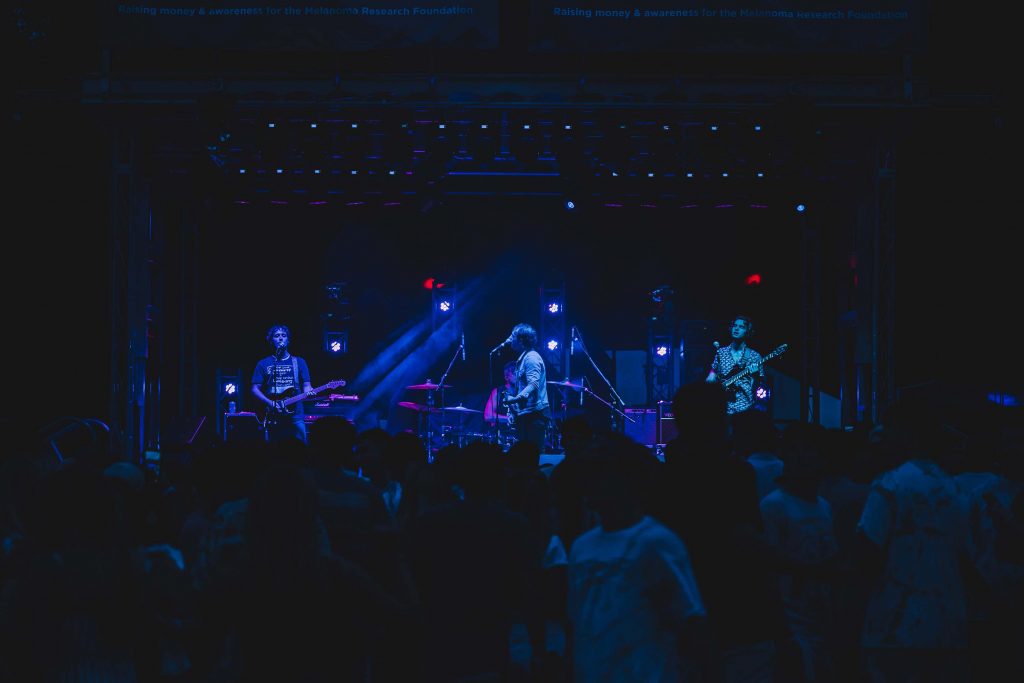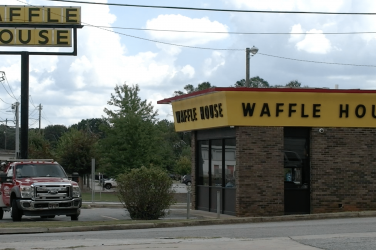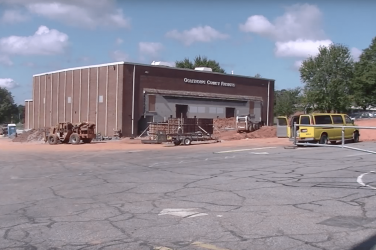Robert King could not wait to get back on stage. He had been without live music for the better part of a year, ever since his former band’s seven shows were cancelled by the beginning of the COVID-19 pandemic. Now, sitting in the green room of the 40 Watt Club, he looked at the signature-covered walls and thought about the lessons he had learned since he was last in this building two years ago.
“My old band, Cosmonaut, we were going to play the 40 Watt opening for someone I can’t remember,” said King, a 21-year-old drummer hailing from Athens. “But as soon as everything hit, we had to reschedule all of our shows. And following that 40 Watt show, we had seven gigs lined up over the next few weeks that all got cancelled. So, it was really tough on us.”
The 40 Watt Club was one of the many live music venues in Athens, Georgia, and across the United States that closed down at the beginning of the COVID-19 pandemic. While many touring bands were forced to return home and lost much of their touring revenue, young musicians and bands were impacted largely by the inability to play live shows, particularly in a city with a music scene as vibrant as Athens.
Lena Rayne Allen, musician, and student at the University of Georgia, was on the brink of her music career when everything started to go into disarray.
I started reaching out to places and it took a really long time to ever hear anything back,” she said. “Then the pandemic happened.”
Performers are eagerly stressed to get back on stage, even if it means facing newfound pressure. Whether it be from putting up newly revised precautions to the overwhelmingly increased workload, Athenian artists are fighting to do what they love once again — connect with people through their music.
The director of the University of Georgia’s music business program, David Barbe, has been a part of multiple startup bands and has worked in the music production business for about 30 years, assisting or leading production on around 400 albums to date. Growing up in Atlanta and often playing shows in Athens, he has firsthand experience with what makes Athens so appealing and important to growing artists in the southeast, and why the shutdown of venues during the pandemic had a huge impact on local musicians.
“If you’re a brand new artist or band, what are you going to do? You’re going to play a show, not release an album or record an EP, but play a live show,” said Barbe. “You weren’t able to do that for the better part of a year and a half, and it has greatly stifled the development of new bands. The feedback from other people that comes from playing a show and building an audience, which is still the best way to do it, didn’t exist. And I think it had a really stifling effect on the development of young bands and artists.”
As time went on, virtual became the new normal. Concerts were held on artists’ social media, collabs were made at a distance, songwriters spent more time writing, and music forums were open to the world of Zoom.
Hotel Fiction was supposed to have a tour the month after the pandemic took everyone by surprise; instead, they were put in a year-long lockdown with canceled events. To make up for something they were looking forward to, they did a couple of live streams for Breaking the Shackles and Nuçi’s Space.
Everything was running smoothly, but the economic reality of a career being paused because of the pandemic hit the music industry hard. Doing things through a computer screen was not going to cut it for much longer.

The band GrandVille experienced an explosion in growth after playing small parties in Albany, Georgia, as well as weddings and fraternity parties at the University of Georgia.
“We seemed to gain a lot of steam in Athens last year, because we stayed up here for the most part, the only time we would leave was for a private event,” said Jackson Tennyson, lead singer and guitarist for the band. “We didn’t play many public events, or tour very much, so we just stayed at UGA and played at a bunch of fraternity parties and stuff like that. It gave us more time to get better as a band, and it was pretty fun.”
Once people started getting their vaccines, venues slowly began making plans to open their doors back up to all the fans and music lovers — but with rules applied due to the circumstances. Proof of vaccination and mask mandates began being implemented in most musical locations.
This makes it tough for either side of the spectrum. Fans must risk getting COVID-19 to see live music, and artists must make the shows happen while worrying about people keeping their masks on or spreading a virus that is not always detected in its early stages.
Allen had her first show out of the pandemic on Sept. 16 at the Flicker Theatre and at Hendershot’s on Sept. 29. She says that she enjoyed performing at both of these shows, especially because these venues require masks and proof of vaccinations.
Jessica Thompson of Hotel Fiction says, “it’s been hard to navigate how we can be responsible and make sure we prioritize everybody’s health — that decision making is a big weight on musicians.”
Music festivals around Athens have been back in full swing, giving bands like King’s ‘Rooster’ and GrandVille, a chance to perform on live stages for a full crowd for the first time since March 2020. Patrons of Athens have been flocking in full force to experience the return of live music, from the Georgia Theatre and 40 Watt Club, to outdoor venues like Terrapin and Southern Brewing Company.
“When we played the [Georgia] Theatre, there were a lot of people, I did not expect there to be a turnout like that,” said James Tennyson of GrandVille. “I think it shows the crowd is excited to be there, you know, they want to be out just as much as you do.”
It was not just GrandVille and Rooster waiting to get back on stage, though, as many other start-up bands and young artists were anxiously awaiting the reopening of venues in Athens, leading to a large rush of musicians looking to get their name out as the pandemic winds down. This has created a bit of competition for young musicians who started during the pandemic, and those with prior stage presence or a following are coming out on top.
You definitely are seeing a lot more interaction from people that you would not have heard of prior to this,” said Jackson Tennyson.
“I think everybody’s coming out wanting to play music and, and, you know, it’s gonna affect how many people get different opportunities to play places in Athens. I guess you really have to prove yourself now on stage, you always have, but especially right now,” Tennyson said.
Now, with increased competition and more opportunities available, musicians are working harder than ever before to make their own path, with many exploring the other sides to music and the marketing that is necessary to “sell” a band.
“Everybody, whether they play music or not, has been dying to listen to music, has been dying to go to concerts, has been dying to hear people put out new new music. And I think that the opportunities are as abundant as they’ve ever been really because the demand is there,” said King. “And really that has put me in a position where I have wanted to pursue things that I probably never even wanted to pursue. Maybe like putting out my own music or writing my own songs and putting them on YouTube or Instagram or whatever, maybe working as a producer or something.”
GrandVille and Rooster have been making the most of their opportunities, with the former playing shows in front of sold out crowds at the Georgia Theatre and Jam For Cam, while the latter has opened for bands at the 40 Watt Club and Eddie’s Attic in Atlanta. While these bands and others look to overcome the effect of the pandemic on their development, one thing is for sure: music is back in Athens, Georgia.
Melissa Garcia and Carson Reynolds are students in the Grady College of Journalism and Mass Communication at the University of Georgia.









Show Comments (1)